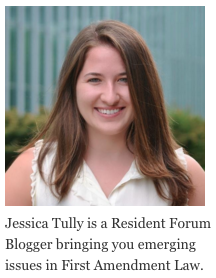Kentucky clerk Kim Davis made headlines over the summer when she was jailed for refusing to issue marriage licenses to same-sex couples. Days after the U.S. Supreme Court legalized same-sex marriage in Obergefell v. Hodges , Davis’ office in Rowan County, Kentucky, stopped issuing marriage licenses. While Davis was in jail for contempt of court, five of her six deputy clerks agreed to grant licenses to both homosexual and heterosexual couples.
Davis appealed her case to the U.S. Supreme Court, arguing that issuing marriage licenses to same-sex couples violated her right to free exercise of religion.
Davis claimed that she was acting “under God’s authority” when she refused to issue marriage licenses to same-sex couples due to her opposition to marriage equality.
Although Davis is not the only clerk to deny marriage licenses to same-sex couples, she has received the most attention for her actions. Her refusal to issue the licenses and subsequent jail time has the country split. Many are applauding Davis for exercising her religious rights, while others are criticizing Davis for her civil disobedience as a public official.
Protecting religious freedom is well-established in American law, but it no longer extends to denying same-sex couples the ability to exercise what the U.S. Supreme Court recognized as a fundamental right.
The U.S. Supreme Court denied Davis’s request without explanation in a brief one-line order. Following the Court’s denial, President Obama reaffirmed that the Court protects religious freedom but that religious freedom doesn’t extend to denying other American citizens their constitutional rights.
Geoffrey Stone, a professor at the University of Chicago Law School, wrote in an article for the Huffington Post that the Court made the right decision in denying Davis’s appeal.
“A public official, who acts as an agent of the government, simply cannot place her own religious beliefs above those of the constitutional obligations of the state and the constitutional rights of our citizens,” Stone wrote. “Davis should have found a way to reconcile her personal religious beliefs with her official responsibilities, or she should have resigned.”
In response to outcry from religious groups, some states, including Kentucky, are considering legislation that would permit public officials to opt out of performing same-sex marriage ceremonies. In North Carolina, the legislature passed a law over the governor’s veto that would allow magistrate judges to refuse to officiate marriage ceremonies. Many have criticized the North Carolina law as being offensive to same-same couples and causing problems for couples who must find a public official to officiate the marriage.
The Utah legislature passed a law in March 2015 that many view as a good compromise between religious liberty and freedom from discrimination. The law ensures that county clerk offices in Utah have a clerk available to marry same-sex couples. A clerk can opt out of performing a same-sex marriage only if there is another clerk who is available to issue the license and perform the ceremony. If a Utah clerk is not willing to perform same-sex marriages, he or she is not able to perform any marriages.
Davis may be out of jail but her legal troubles are far from over. The American Civil Liberties Union sued Davis on behalf of four same-sex couples who were repeatedly denied marriage licenses by Davis, claiming that Davis violated their constitutional rights to marry.
In the meantime, her office in Rowan County has worked out a compromise: Davis’s name is no longer on marriage certificates in order to accommodate her religious freedom, same-sex couples retain their right to marry, and Davis continues to work as the county clerk. Charles Haynes, executive director of the Religious Freedom Center, wrote that “when all is said and done, I am convinced that the outcome in Rowan County will be remembered as a win-win for the Constitution.”
Published November 17, 2015
